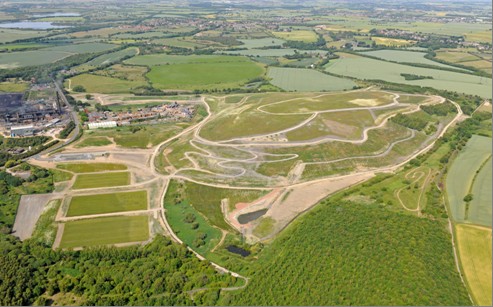Rabbit Ings Colliery Restoration |
81.8% |
Construction Only Award
Project Team
Client: Yorkshire
Forward & The
City of Wakefield Council
Design: N/A
Construction: Carillion
The Project
The project involves the reclamation and restoration of a 67 hectare
site formerly known as the Monckton Colliery and Royston Drift Mine,
now known as Rabbit Ings. The site is owned by the Council of the City
of Wakefield and Project Managed by Yorkshire Forward. Rabbit Ings has
been included in the National Coalfields programme by the Homes and
Communities Agency (formerly English Partnerships).

Carillion, in conjunction with local subcontractors, commenced construction in June 2009. The contract included:
- the restoration and re-gradation of the steep slopes on the site to provide quality public open spaces;
- construction of 4 football pitches complete with an ancillary building to house changing rooms;
- a recreational cycleway plus landscape enhancements.
Significant ecological mitigation was undertaken, 160,000m3 of cut/fill c/w the management, treatment and disposal of any contaminated material and 65ha of landscaping with innovative soil making solutions. The scheme also looked close at public usage and has provided canter tracks, 9 km of footpaths, a down hill mountain bike track, a living classroom for educational purposes and careful security considerations with barriers and horse gate.
Carillion took the decision to apply for the Construction Only Award to demonstrate to the client and the local community our intention to deliver an outstanding project.

Presented by ICE President Richard
Coackley and our regional Chair Rhianna Rose. From left to right:
Carl Aldis – Carillion, Lee Tinkler
– Carillion, Peter Black – EC Harris, Rhianna Rose –
Chair ICE Humber & Yorkshire Region, Stefan Morgan – White,
Young & Green, Dave Towers – Carillion, and Stuart Gibbs –
Carillion
Challenges
The team utilised the knowledge of BMBC Landscape Architect Dr Andrew Banister and landscape contractor N T Killingley to develop soil improvement solutions to the former colliery tip. Careful mapping and testing of the existing soil allowed a revised mix of paper waste and Treated Composted Sewage Sludge (TCCS) to be developed which significantly reduced the amount of imported material by circa 20,000 tonnes which reduced the amount of lorry movements through local villages. This in turn significantly reduced impact on the environment and effect on the general public by 1000 vehicle movements.
The schemes carbon footprint was further reduced by ensuring engineered fill beneath footpaths was compacted to a high standard and so reducing the requirement for imported capping materials of circa 2500 tonnes.
Environmental
Following the discovery of Watervoles and Great Crested Newts on site Carillion worked with Natural England to create a protection strategy.
After a period of surveying and trapping under the supervision of their ecologists, Carillion constructed a new hibernacula using the existing reed beds to translocate the newts outside of the works area before starting the earthworks. A new pond was also constructed and was used as a ‘Living Classroom’ during the works ” to support the educational programme within local schools. Woodland areas of 16 hectares were planted with 36000 trees and shrubs with over 35 hectares of specialist grassland habitat.
We created a innovative hybrid soil strategy to cover the site slopes following restabilisation. The solution consists of using a mix of imported soil, TCCS and composted green waste in different combinations depending on the final planting requirement. Footpaths and ditch linings used recycled aggregates of circa 15000 tonnes, all material being won, crushed and re-used on site.

